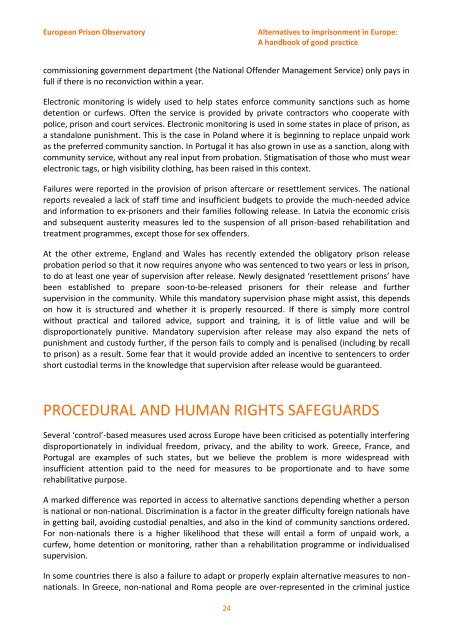good practice
Alternatives%20to%20imprisonment%20in%20Europe
Alternatives%20to%20imprisonment%20in%20Europe
You also want an ePaper? Increase the reach of your titles
YUMPU automatically turns print PDFs into web optimized ePapers that Google loves.
European Prison Observatory<br />
Alternatives to imprisonment in Europe:<br />
A handbook of <strong>good</strong> <strong>practice</strong><br />
commissioning government department (the National Offender Management Service) only pays in<br />
full if there is no reconviction within a year.<br />
Electronic monitoring is widely used to help states enforce community sanctions such as home<br />
detention or curfews. Often the service is provided by private contractors who cooperate with<br />
police, prison and court services. Electronic monitoring is used in some states in place of prison, as<br />
a standalone punishment. This is the case in Poland where it is beginning to replace unpaid work<br />
as the preferred community sanction. In Portugal it has also grown in use as a sanction, along with<br />
community service, without any real input from probation. Stigmatisation of those who must wear<br />
electronic tags, or high visibility clothing, has been raised in this context.<br />
Failures were reported in the provision of prison aftercare or resettlement services. The national<br />
reports revealed a lack of staff time and insufficient budgets to provide the much-needed advice<br />
and information to ex-prisoners and their families following release. In Latvia the economic crisis<br />
and subsequent austerity measures led to the suspension of all prison-based rehabilitation and<br />
treatment programmes, except those for sex offenders.<br />
At the other extreme, England and Wales has recently extended the obligatory prison release<br />
probation period so that it now requires anyone who was sentenced to two years or less in prison,<br />
to do at least one year of supervision after release. Newly designated ‘resettlement prisons’ have<br />
been established to prepare soon-to-be-released prisoners for their release and further<br />
supervision in the community. While this mandatory supervision phase might assist, this depends<br />
on how it is structured and whether it is properly resourced. If there is simply more control<br />
without practical and tailored advice, support and training, it is of little value and will be<br />
disproportionately punitive. Mandatory supervision after release may also expand the nets of<br />
punishment and custody further, if the person fails to comply and is penalised (including by recall<br />
to prison) as a result. Some fear that it would provide added an incentive to sentencers to order<br />
short custodial terms in the knowledge that supervision after release would be guaranteed.<br />
PROCEDURAL AND HUMAN RIGHTS SAFEGUARDS<br />
Several ‘control’-based measures used across Europe have been criticised as potentially interfering<br />
disproportionately in individual freedom, privacy, and the ability to work. Greece, France, and<br />
Portugal are examples of such states, but we believe the problem is more widespread with<br />
insufficient attention paid to the need for measures to be proportionate and to have some<br />
rehabilitative purpose.<br />
A marked difference was reported in access to alternative sanctions depending whether a person<br />
is national or non-national. Discrimination is a factor in the greater difficulty foreign nationals have<br />
in getting bail, avoiding custodial penalties, and also in the kind of community sanctions ordered.<br />
For non-nationals there is a higher likelihood that these will entail a form of unpaid work, a<br />
curfew, home detention or monitoring, rather than a rehabilitation programme or individualised<br />
supervision.<br />
In some countries there is also a failure to adapt or properly explain alternative measures to nonnationals.<br />
In Greece, non-national and Roma people are over-represented in the criminal justice<br />
24





